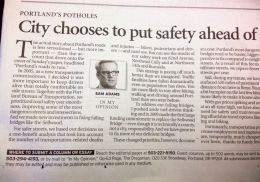
Lest you think my repeated criticisms of the way The Oregonian frames transportation issues was just my personal axe to grind, it’s worth noting that the front page story in their Sunday edition is being called out from many corners.
In addition to the numerous intelligent citizens we’ve heard from in the comments, now Mayor Sam Adams, the Bicycle Transportation Alliance (BTA), and even The Portland Mercury have issued detailed rebuttals to the now infamous, “Portland’s Roads to Ruin” story by The Oregonian’s Beth Slovic.
“I understand bicyclists’ defensiveness about anything that seems anti-bike… Still, should the city be sponsoring bike rides and transit conferences when major streets are in danger of failing… ?”
— Michelle Brence, Slovic’s editor
Mayor Adams has come out full force to defend his record and share his pointed criticism of the article. In a guest op-ed in The Oregonian today titled, Portland’s potholes: City chooses to put safety ahead of smoothness, Adams does not hold back. After detailing his decisions to invest in a safer system, not just a smoother system, he writes:
“Unfortunately, a debate about the relative merits of safety, comfort and accessibility isn’t terribly sensational, so The Oregonian turned the story into something else. The newspaper’s 2,400-word account didn’t mention the word “safety” even once, even though I talked about it nearly two dozen times in my interview.
It’s unfortunate the newspaper squandered an opportunity to tell its readers the true story about the city’s transportation priorities.”
In addition to that op-ed, Adams has posted background info and a Q & A about PBOT funding on his website. To back up his account of the interview, Adams has even posted the full audio recording of his discussion with Slovic.
In a blog post published this morning, The BTA’s leader Rob Sadowsky said The Oregonian article was “simply misleading.” Here’s another snip from Sadowsky’s response:
“An article that truly sought to inform readers, rather than whip up readers’ anger at a perceived runaway government, would have gone through the $222 million budget and actually explained where the money goes.”
The Portland Mercury also chimed in to refute The Oregonian’s piece. Reporter Sarah Mirk says, “The story hits home some good points, but in my opinion, its framing is misleading.” Here’s why she feels that way:
“From a cuts perspective, I’d argue that street repaving and bike projects were actually cut equally, not with bikes as the vampiric top priority. PBOT’s proposed budget calls for cutting $1 million from street preservation, which means the city will only repave 15-20 miles of streets, instead of 40 miles. But the street repaving budget is $9.5 million, so slicing $1 million is a 10 percent cut. PBOT also plans to cut 10 percent of the $1 million neighborhood greenway budget, which is the cash used to make streets like NE Going and SE Spokane better for bikes.”
For their part, The Oregonian defends the article. On Twitter yesterday, Publisher Peter Bhatia referred to it as “Excellent watchdog reporting.” Michelle Brence, Slovic’s editor on the story, even left a comment on BikePortland to stick up for it. Unfortunately, her defense only seemed to make matters worse (at least judging by folks who replied to her comment).
“I understand bicyclists’ defensiveness about anything that seems anti-bike,” Brence wrote, “I’m a bike commuter myself…” Then Brence argued that, “Spending on bike amenities is one tiny reason, and nowhere near the biggest reason.” After that comment, she doubled down on the article’s central — and quite misleading — premise:
“Still, should the city be sponsoring bike rides and transit conferences when major streets are in danger of failing, potentially costing taxpayers (including us bicyclists) millions and millions of dollars down the road?”
For those of you that think we are making too much out of this one article, it’s important to remember that this type of reporting about bicycles is a pattern at The Oregonian that has been going on for many years. Will this current boatload of criticism impact their future work? That’s hard to say. Will they acknowledge their mistake this time? Maybe…
In 2008, an associate editor at the paper, Rick Attig, heard our criticisms and admitted they sensationalized stories at the expense of bicycling. After running several days of above-the-fold stories about road rage incidents involving bicycles, Attig published a mea culpa stating, “Maybe we overplayed this story, but it was compelling to readers…”
Hopefully The Oregonian will realize that their continued sensationalism around bicycling is now compelling many readers to simply ignore them.

